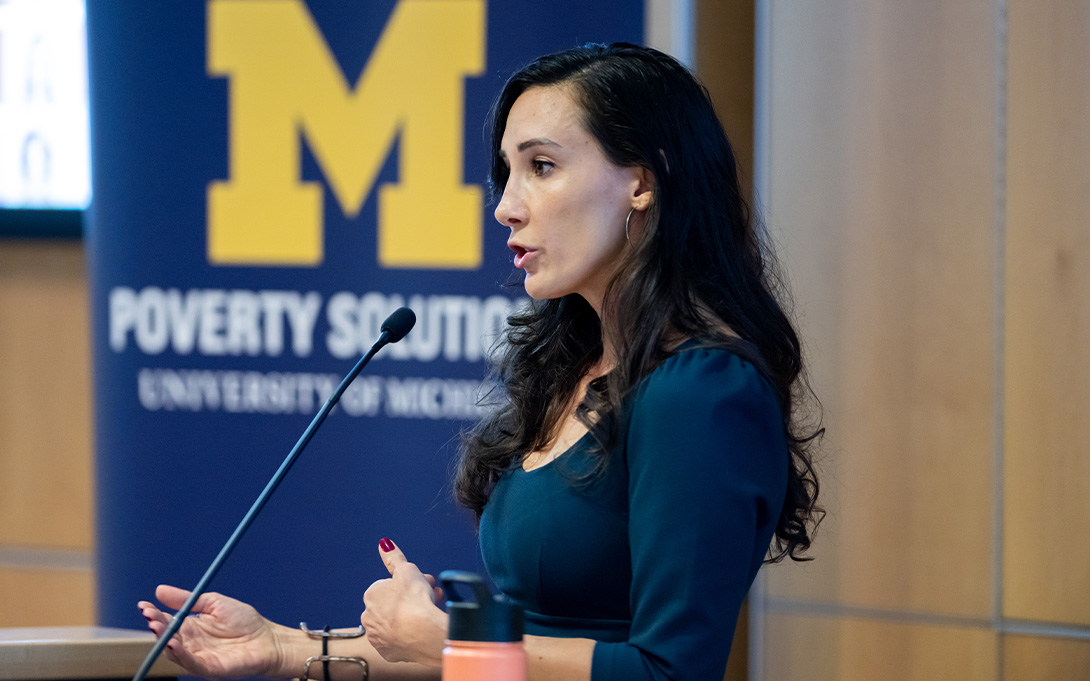
Immigration continues to be a priority in U.S. politics, with the federal government intensifying enforcement efforts through large-scale raids and with the transfer of certain detained migrants to Guantanamo Bay. These actions have fueled ongoing debates over border security, human rights, and the nation's immigration policies, drawing a stronger international attention.
U-M experts are available to provide insights on the legal, political and social implications of these measures.
Mara Cecilia Ostfeld is an associate research professor of public policy, research director at the Center for Racial Justice and faculty associate at the Center for Political Studies.
"Trump is correct that many of his supporters back stricter immigration enforcement, including deporting those without legal authorization to remain in the U.S. However, for most Americans—including the majority of his voters—immigration is not the top priority. The economy is," she said.
"In fact, those who voted for Trump in November were more than twice as likely to cite the economy, rather than immigration, as the most important factor in their decision. With immigration already at historic lows and consumer sentiment declining, his continued attacks on immigrants are a risky strategy—especially considering that nearly 20% of the American labor force is foreign-born."
Contact: [email protected]
Kristina Fullerton Rico is a postdoctoral fellow at the Center for Racial Justice.
"It is not just actual deportations that cause harm. The threat of deportation is enough to create fear and uncertainty for undocumented immigrants and their families," she said. "This sense of heightened 'deportability' discourages people from doing the everyday things they would otherwise do. This can look like parents keeping their children home from school, not seeking medical care, and otherwise staying home, unless it’s absolutely necessary to go out.
"The threat of deportation also makes people hesitant to exercise their rights, such as the right to report dangerous conditions at work, and—since immigrants are overrepresented in dangerous industries—this can lead to a higher risk of being injured or even dying on the job. The chilling effects of heightened deportability impact undocumented immigrants, their families, their communities and anyone who 'looks like they might be undocumented' because of racial profiling.
Contact: [email protected]
William Lopez is a clinical assistant professor of health behavior and health equity, senior adviser at Poverty Solutions and faculty associate in Latina/o studies.
"The Trump administration is putting the pieces in place for the mass deportation it promised, and we are already seeing increased presence of ICE in communities throughout the U.S., including our own in Wayne and Washtenaw counties," he said.
"The millions of deportations proposed are more than the U.S. has conducted prior, and will involve police officers, the military and regular citizens with no prior exposure to the immigration process. Among the many communities impacted will be our nation's educators, who, research shows, will teach to empty classrooms, explain parental disappearance to their students, and be forced to address the achievement gap between Latino and white students that follows periods of increased immigration enforcement."
Contact: [email protected]
Edgar Franco-Vivanco is an assistant professor of political science whose research explores how colonial era institutions and contemporary criminal violence shape economic underperformance, particularly within Latin America.
"The current administration's approach to immigration will undeniably have adverse effects on thousands of families and hundreds of communities," he said. "The planned deportations will separate families and create an environment of fear and suspicion, affecting not only undocumented immigrants but also many American citizens who could be racially targeted. However, it is unrealistic to expect that nearly 11 million undocumented people living in the U.S. will be deported. Such an operation would be extremely complex and expensive, clashing with goals of reducing government spending.
"Another important aspect of this policy concerns relations between the U.S. and Latin America. Under this administration, we will see a changing environment, with Latin American countries trying to adapt to the dual threats of mass deportations and tariffs. Their responses will vary, depending on each country's leadership and leverage in negotiations."
Contact: [email protected]
Silvia Pedraza, professor of sociology and American culture, is an expert on the sociology of immigration and race and ethnicity in America, Cuba and Western Europe.
"I think we would do well to acknowledge that the strength of American society has always been that it is a nation of immigrants," she said. "We are not a homogeneous nation, but a nation of people who brought all their various cultures, life experiences, despair and gratitude, and with it wove the cloth that fashioned American culture.
"The most common misconception I encounter is when I point out to a white colleague that they also have an immigrant family history and that their family also came from another country. They immediately agree, but soon say: 'Yes, but they came here legally.' To this, I reply: 'Yes, but they came here before the 1924 Immigration and Nationality Act, the first set of immigration laws in America. There were no laws for them to break. They came ... with the same despair of people today who come from Latin America, from Africa, from Asia.'"
Contact: [email protected]
Written by Juan Ochoa, University of Michigan News

